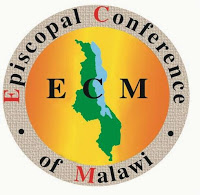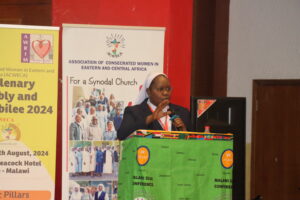MALAWI: Understanding the New Structures of ECM Secretariat

The Episcopal Conference of Malawi (ECM) has created a Social Development
Directorate, an umbrella body that brings under one management, five Commissions
of the Conference. The new structure is a direct implementation of
the aspirations of the ECM strategic framework 2013-2015.
Directorate, an umbrella body that brings under one management, five Commissions
of the Conference. The new structure is a direct implementation of
the aspirations of the ECM strategic framework 2013-2015.
In
an exclusive interview with AMECEA Online News in Nairobi, the new director of
ECM Social Development Directorate, Mr. Carsterns Mulume said that all
activities of the conference have been streamlined into three major
directorates namely the Social Development Directorate, the Pastoral
Directorate and the Finance, Investment and Administration Directorate.
an exclusive interview with AMECEA Online News in Nairobi, the new director of
ECM Social Development Directorate, Mr. Carsterns Mulume said that all
activities of the conference have been streamlined into three major
directorates namely the Social Development Directorate, the Pastoral
Directorate and the Finance, Investment and Administration Directorate.
“During
the consultations, it was realized that there was lack of integration amongst
the social commissions, namely the Catholic Development Commission in Malawi
(CADECOM), Catholic Commission for Justice and Peace, Catholic Health, Catholic
Education as well as Catholic Social Communications Commissions. Basically you
would find that CADECOM for instance would independently be implementing a food
Security program in one area and targets the schools, which belongs to the
Education Commission,” Mr. Mulume explained.
the consultations, it was realized that there was lack of integration amongst
the social commissions, namely the Catholic Development Commission in Malawi
(CADECOM), Catholic Commission for Justice and Peace, Catholic Health, Catholic
Education as well as Catholic Social Communications Commissions. Basically you
would find that CADECOM for instance would independently be implementing a food
Security program in one area and targets the schools, which belongs to the
Education Commission,” Mr. Mulume explained.
He
said that the matter was even worse whenever there were calls for proposal to
fund certain projects and several commissions would apply at the same time. “At
the end of the day the Secretary General would have to sign three to four
proposals going to the same partner. We needed to therefore merge and come up
with an integrated approach to our programming
said that the matter was even worse whenever there were calls for proposal to
fund certain projects and several commissions would apply at the same time. “At
the end of the day the Secretary General would have to sign three to four
proposals going to the same partner. We needed to therefore merge and come up
with an integrated approach to our programming
As
a result The Catholic Bishops in Malawi decided to establish the Social
Development Directorate which comprises of five commissions namely
CADECOM/Caritas Malawi, Health, Justice and Peace, Education and Social
Communications.
a result The Catholic Bishops in Malawi decided to establish the Social
Development Directorate which comprises of five commissions namely
CADECOM/Caritas Malawi, Health, Justice and Peace, Education and Social
Communications.
He
said that the directorate plans to come up with a joint capacity statement and
a strategic plan which will be aligned to ECM Strategic framework. “This is
going to foster our joint strategic advocacy, as well as strengthen the
technical committee within our institutions as we try to be more aggressive
while mainstreaming the Social Teachings of the Catholic Church.”
said that the directorate plans to come up with a joint capacity statement and
a strategic plan which will be aligned to ECM Strategic framework. “This is
going to foster our joint strategic advocacy, as well as strengthen the
technical committee within our institutions as we try to be more aggressive
while mainstreaming the Social Teachings of the Catholic Church.”
He
explained that ECM is not dismantling Commissions but rather ensuring that they
are as vibrant as possible. “The Director of Social Development Directorate has
to oversee vibrant functioning of the Commissions through resource
mobilizations and programs implementation by working in an integrated manner and
as a team. This will also ensure cordial working relationships among the
commissions.”
explained that ECM is not dismantling Commissions but rather ensuring that they
are as vibrant as possible. “The Director of Social Development Directorate has
to oversee vibrant functioning of the Commissions through resource
mobilizations and programs implementation by working in an integrated manner and
as a team. This will also ensure cordial working relationships among the
commissions.”
Mulume
explained that the directorate must always have firsthand information on the
projects being implemented by the commission and has a mandate to give
directions wherever necessary and follow up on the reporting. “The Commissions
can get funding on their own initiatives but this must be through the office of
the Director,” he explained adding that instead of the Secretary General of the
Conference getting five reports from the commissions, there will be only one integrated
report from the directorate; similarly instead of the Secretary General
reviewing five proposals at the same time, the proposals would have been
reviewed by the Social Development office and a recommendation given.
explained that the directorate must always have firsthand information on the
projects being implemented by the commission and has a mandate to give
directions wherever necessary and follow up on the reporting. “The Commissions
can get funding on their own initiatives but this must be through the office of
the Director,” he explained adding that instead of the Secretary General of the
Conference getting five reports from the commissions, there will be only one integrated
report from the directorate; similarly instead of the Secretary General
reviewing five proposals at the same time, the proposals would have been
reviewed by the Social Development office and a recommendation given.
To
avoid dependence of commissions that are not capable to raise funds for the
implementations of their projects, Mulume said that the directorate plans to build
capacity of each commission on resource mobilization, monitoring and evaluation
and any other relevant field to ensure effectiveness and vibrancy.
avoid dependence of commissions that are not capable to raise funds for the
implementations of their projects, Mulume said that the directorate plans to build
capacity of each commission on resource mobilization, monitoring and evaluation
and any other relevant field to ensure effectiveness and vibrancy.
By Pamela Adinda, AMECEA Online
News
News


